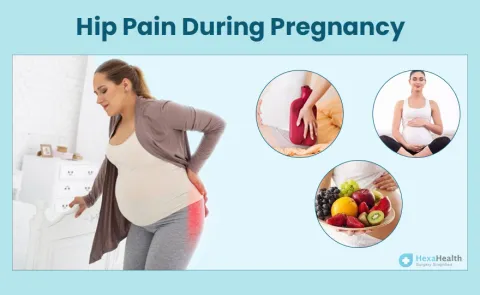Vomiting in Pregnancy - Best Home Remedies, When It Starts?

Quick Summary
- Morning sickness is common during the first trimester of pregnancy.
- Nausea and vomiting usually go away by the second trimester.
- Home remedies can help relieve morning sickness.
Vomiting in pregnancy is very common and generally referred to as nausea or morning sickness. Most women experience morning sickness during the first trimester or the initial 12 weeks of pregnancy. In most cases, this feeling of nausea disappears with time and ends as soon as women reach their second trimester.
But there can be a few who may experience vomiting during pregnancy longer than expected. In such cases, apart from approaching the doctor, pregnant women can also go for some home remedies to stop the feeling of vomiting. Here is everything related to how to stop vomiting in pregnancy in this article.
Causes of Vomiting in Pregnancy
Many women say and believe that vomiting happens due to hormonal changes. In fact, according to several studies, a hormone called human chorionic gonadotropin (hCG), released by the placenta - causes episodes of vomiting during pregnancy.
Vomiting typically results from hCG being released quickly after a fertilised egg adheres to the uterine lining. Approximately 70% of women experience it and don’t know precisely why vomiting during pregnancy happens.
Besides, nausea can happen through specific food smells, stress, anxiety, tiredness, or vitamin D deficiency. But, figuring out one reason for morning sickness is not possible.


Benefits of Home Remedies for Vomiting in Pregnancy
Many people prefer a home remedy with natural ingredients over store-bought medications loaded with chemicals. Over time, home remedies have proven to be beneficial in several ways. Some of these benefits are:
- Natural: The one aspect of home remedies that makes them a hit is that they are natural. No artificial substances are involved, and one can be sure they are safe for her body.
- Cost-efficient: One can save a lot of money by leaning more towards home remedies. A home remedy is far more cost-effective than a store-bought drug. As the name suggests, one can find the ingredients for a home remedy at her home.
- Mild: Home remedies are mild as they are composed of organic substances that have no harmful effects on one’s body.
- Reliable: The ingredients required for a home remedy have persisted for a long time, making them a more reliable and stable choice of medicine than store-bought medications.
- No side-effects: One of the main benefits of a home remedy is that it has no side effects. Furthermore, one needs to learn what goes into making a company drug and how safe it is.
- Easily accessible: Most of the ingredients of a home remedy are available at one's home. Or one can also grow a medicinal plant in his/her backyard and save it for future use.
Home Remedies to Stop Vomiting during Pregnancy
How to stop vomiting in pregnancy with home remedies is a common question that gets tossed around often. The below-mentioned home remedies are safe and can stop your nausea and vomiting feelings. But remember to thoroughly review these and check for allergic or forbidden ingredients before trying.
- Ginger: Ginger is considered one of the safest options and best friends of pregnant women experiencing vomiting. Although it cannot relieve vomiting, it can be used to control the feeling of nausea that eventually leads to vomiting.
Expected women can take ginger in the form of ginger ale, ginger tea, or even ginger lollipops. - Lemon: To stop vomiting during pregnancy, the smell of lemons can significantly help. To start the day right, an expecting mother can drink a glass of lemon water with a spoon of honey. They can even keep lemon peels with them and smell them whenever nausea hits.
- Crackers: Most of the crackers are bland and rich in carbohydrates. Eating a cracker early in the morning can help soak up any acid accumulation that may have happened during the night.
- Peppermint: During pregnancy, peppermint's minty smell and taste help relieve a pregnant woman from nausea and vomiting. Peppermint contains menthol, which gives it a different flavour and odour. One can drink peppermint tea with a drop of honey to ease vomiting.
- Fennel: The exquisite flavour and aroma of fennel make it a great choice to ease vomiting during pregnancy. One can add a small spoon of fennel seeds into a cup of water and soak them for 10 minutes, after which the tea can be consumed.
- Cloves: Over time, cloves have been used as a folk medicine to ease morning sickness. It has a compound called eugenol that gives a strong smell and taste, thus, helping with vomiting and nausea.
Lifestyle Changes
When one starts to incorporate home remedies and eliminate medications, he/she will make a healthier lifestyle choice. For instance, by adding ginger and turmeric to one's diet, he/she can cope with nausea and chronic pain. Let’s talk about some lifestyle changes that help ease vomiting during pregnancy:
- Drink Water: Drinking water is again the safest way of keeping the feeling of nausea and vomiting in pregnancy away. A pregnant woman should drink water as soon as she gets up and keep herself hydrated.
- Small Meals: One more way to avoid nausea is by eating small, frequent meals and not being hungry or on an empty stomach.
Pregnant women can try to eat after every 1 to 2 hours and include more carbohydrate-rich foods in their diet. They should also avoid oily and spicy food that can trigger vomiting. - Exercise and/or Yoga: During pregnancy, it is essential to keep your body active. One can do morning yoga or walk to get some fresh air. However, one should remember not to overwork herself and take ample rest along with yoga.
- Choice of Clothes: It has been advised to wear loose clothes to restrict any pressure on the abdomen.
- Acupressure: Therapies such as acupressure and acupuncture can also help eliminate morning sickness. Acupressure involves applying pressure to acupoints using a particular band on the forearm.
During this process, the brain releases neurotransmitters that reduce nausea and vomiting symptoms by putting pressure on specific parts of the body.
Tips to Remember - Home Remedies to Stop Vomiting in Pregnancy
It has been estimated that 70% of women feel nausea during the initial pregnancy stage. And during this stage, while using home remedies, the following are a few tips women should keep in mind:
- Always consult a healthcare professional before trying new remedies, especially if you have a history of medical conditions.
- It has been advised that pregnant women should eat something light every two hours to prevent nausea.
- Be aware of the potential side effects or interactions with other medications or supplements.
- While home remedies work fine, women should avoid any trigger or something that makes them nauseous. If one is familiar with what makes her nauseous, then it is best to avoid it.
- Keep track of symptoms and notify your healthcare provider if symptoms persist or worsen.
- Along with taking short walks for fresh air, pregnant women should keep a fan nearby to make breathing easier. Having a fan keeps the room well-ventilated, thus, eliminating vomiting sensations.
- Be mindful of the quality and source of ingredients used in remedies.
- Stay well-hydrated and monitor fluid intake to prevent dehydration.
When to Consult a Doctor?
It is imperative to know when one should visit the doctor. When vomiting reaches a stage that leads to dehydration and does not stop, causing hyperemesis gravidarum, one should look for medical assistance.
For a clear idea, one should visit the doctor when:
- She is not able to digest the food for more than 12 hours
- If there is blood in vomit or vomiting happens more than once or twice in a day
- Pain in the abdomen or pelvic area
- Weight loss or any signs of dehydration
- Dark urine
Takeaway
Pregnancy is a great chapter, and you would enjoy it fully. But, with pregnancy comes the fear of nausea and vomiting. Pregnancy and vomiting indeed go hand in hand for some of you.
Vomiting in pregnancy starts when you enter your first trimester and usually ends during the start of the second. You can follow the above-mentioned guide, which includes everything there is to know about home remedies to stop vomiting during pregnancy and when to visit a doctor.
In the meantime, you can also visit HexaHealth and discuss your case or situation with some of the best doctors in the country. They can provide you with assistance and guidance, keeping your symptoms in mind. HexaHealth is your one-stop platform for all your healthcare needs. Contact a HexaHealth expert TODAY!
Frequently Asked Questions
Is vomiting in pregnancy considered normal?
How to stop vomiting in pregnancy with home remedies?
What time of the day is vomiting during pregnancy common?
How many times is vomiting normal during pregnancy?
What is the difference between vomiting during pregnancy and vomiting normally?
When does vomiting start in pregnancy?
Why is vomiting during pregnancy seen?
Why do women experience nausea and morning sickness during pregnancy?
What does blood in vomit mean during pregnancy?
When a pregnant woman vomits a lot, it can cause trouble and irritate the lining of the oesophagus. It can further lead to small blood traces or dried blood in the vomiting.
In the case of an oesophageal tear, there can be more than usual traces of blood in the vomiting. In such cases, it is advised to visit a doctor at the earliest.
What should be done if we see pregnant women vomiting frequently?
Are pregnancy and vomiting related?
What are the causes of vomiting in early pregnancy?
What are the severe causes of vomiting in pregnancy?
How to prevent vomiting in pregnancy?
How to control vomiting in pregnancy?
How to stop vomiting during pregnancy?
Which is the best vomiting in pregnancy treatment modality?
Does lemon stop vomiting during pregnancy?
What should be avoided to control vomiting during pregnancy?
Is coconut water good during pregnancy?
Are home remedies safe and effective to stop vomiting during pregnancy?
What does pregnancy vomit feel like?
Does vomiting hurt the baby while pregnant?
When is vomiting during pregnancy a matter of concern?
What are the risks and complications of vomiting during pregnancy? Can vomiting cause miscarriage?
Normal vomiting does not harm the developing foetus. The greater risk is hyperemesis gravidarum or dehydration if a pregnant woman frequently vomits. Both the mom and foetus's health may suffer from dehydration.
According to studies, women who experience nausea or vomiting in the first trimester are at a lower risk of miscarriage than those who do not.
References
All the articles on HexaHealth are supported by verified medically-recognized sources such as; peer-reviewed academic research papers, research institutions, and medical journals. Our medical reviewers also check references of the articles to prioritize accuracy and relevance. Refer to our detailed editorial policy for more information.
Last Updated on: 20 November 2023
Reviewer

A specialist in Obstetrics and Gynaecology with a rich experience of over 21 years is currently working in HealthFort Clinic. She has expertise in Hymenoplasty, Vaginoplasty, Vaginal Tightening, Labiaplasty, MTP (Medical Termination...View More
Author
HexaHealth Care Team
HexaHealth Care Team brings you medical content covering many important conditions, procedures falling under different medical specialities. The content published is thoroughly reviewed by our panel of qualified doctors for its accuracy and relevance.
Expert Doctors (10)
NABH Accredited Hospitals (6)
Latest Health Articles



























 Open In App
Open In App